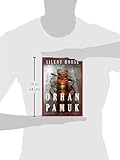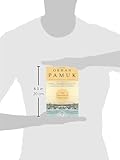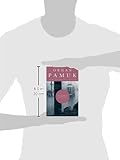What deeply dissatisfies Anna, Doris Lessing’s protagonist and surrogate in The Golden Notebook, is her inability to use the novel to make philosophical statements about life. Anna has just published her first book and is struggling with writer’s block. But Anna’s is not the kind of block that keeps one from producing new words. Hers is an older and much graver ailment; she is actually able to write but what mars her while writing is an inner and dogged tussle to impose a unified narrative on the increasingly fragmented reality that threatens her sense of order, and ultimately her very sanity. Nostalgic about Thomas Mann, she writes in her ominously ‘black notebook': “Yet I am incapable of writing the only kind of novel which interests me: a book powered with an intellectual and moral passion strong enough to create order, to create a new way of looking at life.”
Exactly sixty-one years after her birth, I wonder what solace Anna might have found in reading the Turkish writer, Orhan Pamuk. In the hands of Pamuk, the novel is not reduced to what Anna calls “an outpost of journalism…reporting the existence of an area of society, a type of person, not yet admitted to the general literate consciousness.” His novels are vivid realms of Turkish social, historical, and political life, peopled with a broad array of characters: quixotic, solitary, romantic, intellectual, grotesque, mysterious, desolate, farcical, etc. But more significantly what his fictions genuinely retain is the “the quality of philosophy” Anna so passionately longs for; the lives of the characters are interspersed with moments that lift them out of their specific historical or social contexts to the domain of philosophical doubt and enquiry.
In Silent House, Pamuk’s second novel first published in Turkey in 1983 and now translated into English by Robert Finn for the first time, one such moment is reached very early on. In Cennethisar, a former fishing village near Istanbul, Fatma, a ninety-year-old widow lives in an old crumbling mansion. Her memory takes her back to the day when many years ago Talat Pasha exiled her husband, Sellahatin. After a frustrating discussion with Fatma about where they shall go to live, Sellahatin returns to the bedroom and breaks down. When Fatma comes to see him like this, somewhat distracted, she comes out and observes: “I… sit at the table and stare at the water pitcher… I wonder, as though astonished at this, as though the pitcher of water is something miraculous.”
Unlike her husband, Fatma is a firm believer in God; for her the world is generally concrete and tangible. But in the instances like above, she is visited upon by an idealist’s disbelief towards the truth of empirical reality and the Platonic possibilities of finding that chasm between the ontological existence of things and the corresponding impressions they create on the human mind through sensory impulses. A pitcher of water, thus, is not a pitcher of water; its mystery can’t be grasped with or unraveled to the human mind in absolute terms for senses are insufficient, deluding, fallacious.
Sellahatin, on the other hand, is not in any remote way like the Muslim sultan of twelfth century, Salahuddin Ayyub. Popularly known as Saladin in the West, he fought Richard First of England (also Richard the Lionheart) during the Crusades and recaptured Jerusalem from the control of Christians. Instead, Pamuk’s Sellahatin is a doctor born in the same year as the fiercely secular reformer of modern Turkey, Mustafa Kemal: 1881. Sellahatin doesn’t pay attention to “the war news from Palestine, Galicia, or Gallipoli.” Though a fan of Rousseau, he wants to outsmart the Europeans by rediscovering modern knowledge on his own. While laying the foundations of the house in Cennethisar Fatma now lives in, he wants a European kitchen and separate rooms for each of his kids, “because everyone should be able to shut himself up and develop his own [individual] personality.” During the exile, Sellahatin’s intellectual solitude deepens while Fatma refuses to agree with him that God doesn’t exist. His lusty affair with a female servant results in two bastard sons, Recep, a dwarf, and Ismail, a cripple. He outlives Mustafa Kemal by four years but dies in 1942 before completing “encyclopedia of everything” meant to educate the East— “slumbering in dark and despicable Middle Ages” — about the values of Enlightenment and the superiority of science that has come to replace God with “nothingness.”
Pamuk’s sheer power of narration manifests in the way Sellahatin’s character unfolds. In Fatma’s mind, Sellahatin is a recurring reminiscence; we only come to him through Fatma’s interior monologues which quickly turn into dialogues and argumentation between the two, unfolding in brisk theatrical scenes and premeditated setting. Yet Sellahatin is an autonomous, fully-realized character.
Silent House is a tale that grapples across generations with the heritage left behind by a Turkish father-of-the-family. In the beginning, three grandchildren, Faruk, Metin, and Nilgün come to visit grandmother Fatma during a summer vacation. Though they are different in temperament, all three of them carry seeds of their grandfather. Faruk, the eldest brother is an associate professor obsessed with history and visiting archives. Metin, a nerd, has extraordinary computational skills. Unlike Faruk, he doesn’t get along well with their sister, Nilgün, a Communist who reads Fathers and Sons and takes morning dips in her blue bikini in the sea.
Much of the fuel to the plot, however, is provided by Hassan, son of Ismail, a lottery ticket-seller. Hassan himself is a high school dropout and a member of a local nationalist group. He has cherished childhood memories of playing together and being friends with Nilgun. As he sees her cousins’ car driving past, he spots her and he’s already in love. The next morning, he follows her to the beach and steals her green comb.
One is reminded of Kemal here, the protagonist of Pamuk’s novel The Museum of Innocence that appeared in 2008. But before I draw a relationship between Kemal and Hassan, it is very important to understand where from Kemal comes. Kemal, the influence is much obvious, owes a part of his soul to Flaubert’s Frederic Moreau. Frederic is a modern intellectual unable to come to terms with fleeting human relationships in mid-nineteenth century Paris informed with the lingering undercurrents of French revolution and the emotional and moral turpitude of the society undergoing radical transformation. In comparison, Kemal, like most of Pamuk’s heroes, dwells in the melancholy ruins of the Ottoman Empire. But like Frederic, Kemal’s pursuit of love, his sentimental education, is grand and ambitious and obsessive, the first seeds of which we see in Hassan; it unfolds at a majestic scale when towards the end of the novel, Kemal succeeds in creating a public archive, real and metaphorical, of dead Fusun’s things, rendering her memory eternally visible and available. Kemal says: “…we should find consolation in an object that reminds you of them, something...even an earring.”
Pamuk’s obsession of things — the author created a real museum after The Museum last year in Istanbul — also relates to Pablo Neruda in “An Ode to Things.” The poem is an effervescent celebration of things and tools made by human civilization, things as fruit of human labor, life as an experience of wading through “an irrevocable river” of things, things only as things, lovable because one loves them, things one loves because one lives with them. But again, it is the idea of the lover finding beloved’s presence in the things she touched and held that predominates much of the poem: …fans upon/whose feathers/love has scattered/its blossoms/glasses/knives and/scissors –/all bear/the trace/of someone’s fingers…. Like Neruda’s narrator, Hassan has moments of intimacy and expectant joy while browsing Nilgün’s bag: “I went through it quickly : a tube of suntan lotion, matches, a key warmed by sun, another book, a wallet, hair clips, a little green comb, sunglasses, a towel, a packet of Samsun cigarettes, and another small bottle.” And then again looking at the world through the comb that has become equivalent of Hassan’s entire world: “Looking at the comb in the sunlight that came in the window…I thought how this thing I held in my hand had been in the deepest corners of the forest of Nilgün’s hair.”
In Silent House, however, Hassan’s love remains unreciprocated and things get nasty when roused by the fellow members of his group, he assaults Nilgün. Very early the next day, with a fake identity, an oblivious Hassan boards a train that will take him away from the small insignificant village to the vast cities of a country torn between the past Ottoman grandeur and the prevalent poverty, Godly rural workers and Godless urban elite, Mustafa Kemal and Karl Marx, cold games of Carter and Brezhnev, to a modern republic on the cusp of a military coup. And dealing with all these contradictions together, unlike Lessing’s Golden Notebook — though by different means an equally important and chaotic book — the baroque beams of this bildungsroman don’t crumble or fall apart. Silent House, with its desolate air and graceful, gothic windows, is an essential addition to one of the top shelves of my bookrack devoted singularly to Orhan Pamuk.
Feroz Rather is attending the MFA program at Fresno State and works as an editorial assistant at The Normal School.
Click here for Feroz Rather's previous contributions to Warscapes.




